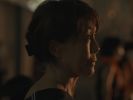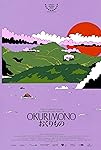Eye For Film >> Movies >> Okurimono (2024) Film Review
Okurimono
Reviewed by: Sergiu Inizian

After returning to Nagasaki to prepare for the sale of her mother's home, Noriko faces an unexpected challenge - recollecting and understanding her mother's feelings about her experience as a survivor of the atomic bombing. Filmmaker Laurence Lévesque crafts her documentary around the personality of the Japanese woman, unobtrusively capturing her as she remembers her mother and relives her trauma, along with other survivors. Beautifully shot and measured in its purpose, Okurimono invites the viewer to patiently discover the emotional layers of a story about generational pain and the need to constantly address it to pave the path for rejuvenation.
As soon as Noriko arrives from Canada, she starts sorting the belongings kept within the decades-old walls. Her arduous routine is familiar to anyone who has had to prepare a beloved household for sale. Among the dusty boxes and old kitchen appliances, the woman and her sisters remember their mother, father, and some faded memories of the seaside home. As the withdrawn but attentive camera allows them to speak freely, they acknowledge their mother's stoic silence about her experience during the nuclear bombing. But once Noriko finds a box of post-war letters between her and distant relatives, she is compelled to dig deeper into the city's traumatic past.

The protagonist becomes a spontaneous interviewer, allowing other survivors to tell their stories to the camera. Conversing with them, she quickly finds out that Hibakusha, as they're called, often don't discuss their trauma with family members. It is especially difficult for them to acknowledge their painful past, bearing a sense of guilt regarding their survival and subsequent radiation. The documentary unveils a strong connection between the survivors and the mountains, which protected some parts of the city from the explosion and acted as shelter from the aftermath. Lévesque and cinematographer Sébastien Blais are very much interested in exploring this bond, capturing a thriving vegetation that not only eases Noriko's pain but also acts as a reminder of Nagasaki's resilience.
The visuals expand further from the greenery, capturing beautiful sunsets and pastel impressions of the quaint structures. Contrasting with how survivors describe the discordant colours of the impact, the documentary employs a visual composition that briefly shelters the eye from the city's horrid past. Wilhelm Brandl's emotive score enhances this ambience, weaving the bomb siren within its notes to create a wailing soundscape that invites meditation and immerses the audience in Noriko's puzzled thoughts.
Lévesque displays deep empathy towards the woman's difficult relationship with the letters. Reading the devastating words, Noriko's affected voice drives the narrative onto a path of resonant rediscovery. Presented with no artifice by a filmmaker unafraid of exploring trauma, a recollection of grief emerges on the screen. As Noriko absorbs the experiences of her mother through the eyes of others, she gains an insight into a past that was as unfamiliar to her in her childhood as it is in the present.
Okurimono, which means "gift" in Japanese, lives up to its title. As it slowly opens, its enigma is defined by empty rooms and quiet streets. But it rewards patience, unveiling a multifaceted narrative of personal and communal trauma, devoid of any unnecessary embellishments. Driven by a clean visual style and an empathetic cinematic eye, it focuses on Nagasaki's present charm and its hardened people. At the centre of it all, Noriko allows the viewers to join her on a journey for solace amid reflections on a tragic history, which evolves into a tender poem that honours her mother with heartfelt intensity.
Reviewed on: 18 Apr 2024
















